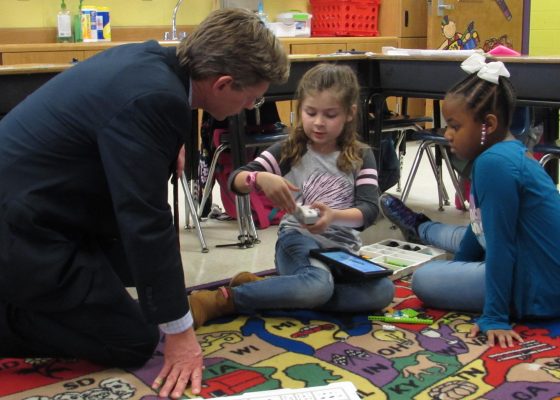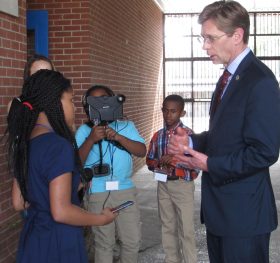Mackey ‘blown away’ with Demopolis City Schools

“Blown away” is how Dr. Eric Mackey described his visit to Demopolis City Schools on Friday.
Mackey, the Alabama superintendent of schools, and his chief of staff, Dr. Jeff Langham, spent time at each of the four campuses, meeting students, observing classes in action, talking with principals and teachers and inspecting facilities.
“The word is ‘wow’,” said Langham.
Mackey, a former high school physics and chemistry teacher in Calhoun County and superintendent of Jacksonville City Schools, served as the executive director of the School Superintendents of Alabama before being chosen superintendent in April 2018.
“I look for engaged students, friendly and caring teachers, principals who love what they do and good, clean, healthy schools,” he told the U.S. Jones student who interviewed him for a broadcasting class.
And he said later that is just what he found. Each of Demopolis’ schools met his criteria.
Mackey has visited 20 school systems since he became superintendent, but Demopolis is only the second one where he has visited all the campuses. He chose the city because of the DCS superintendent, Kyle Kallhoff, whose career and advancement he has followed. Since Mackey was unable to attend the formal opening of Lab 212 in the fall, he thought this visit was a good opportunity to see the facility. He also wanted to visit a school system that was removed from the center of the state in a more rural area.
The visit started at Demopolis High School and Dylan Parten’s 9thgrade pre-AP biology class. There Mackey asked questions as the students conducted experiments on photosynthesis.
Meggin Mayben introduced them to the students in her broadcasting class working on projects for the DHS news casts, graphics and website design.

“This is something they love to do,” she said, and thanked the superintendent for the arts grants from the state that went a long way toward helping build the studio from scratch.
Blaine Hathcock, DHS principal, added that the class provides “branding and getting positive things into the community.” The goal is to be self-sufficient doing ads for local businesses, he said, and to have students ready to compete globally when they complete their high school education.
Mackey was welcomed with a large banner and student escorts as he arrived at Demopolis Middle School.
After visiting two 8thgrade English classes that were debating the subjects of corporal punishment and social media, Mackey toured the newly opened Lab 212, a STEAM (science, technology, engineering, arts and math) center.
There, 6thgrade science and math classes determined the relative distance of planets from the sun using toilet paper while 3-D printers were creating models of the planets to use in displays.
During his interview with student Savannah Ogden in the DMS broadcasting studio, Mackey said
middle schools are the most important years of education. If students aren’t engaged with school by then they are more likely to drop out.
“We want to make sure we have stronger middle schools,” he said. During his visit to Lab 212, he added, “I didn’t see anyone not engaged.”
Westside Elementary literally rolled out the red carpet for Mackey, demonstrating its embrace of the Leader in Me program.
Langham voiced his delight. Leader in Me, he said teaches character development and citizenship, what he called biblical principles packaged in a secular medium.
At WES the group visited Terri Speegle’s second grade class. The children were building LEGO robots and coding. They also watched as Becky Holley’s art students created snowmen.
The final stop of the day was U.S. Jones Elementary where the visitors had to step out of the way in the halls while students worked on experiments with programming drones.
The biggest issue for state schools is staying up with or getting ahead of the fast pace of technology, Mackey told reporters. The question is, “How do we make sure we have the equity of opportunity?” he said.
Base funding for teachers in the state is safe, but the challenge is trying to get advantages in every school, not just those near major manufacturers in the larger cities.
He also said it is a struggle to recruit and retain STEM teachers.
“What we’ve seen today is so encouraging,” Mackey told Kallhoff. The collaboration and partnership between the school system and the community “is very impressive.”
While the state board does not direct the Pre-K program, Mackey said it works closely with the Department of Early Childhood Education. Together they are asking Ivey to include an extra $25 million in the budget for Pre-K expansion every year until it is fully funded, which he hopes will be in four years.
During the upcoming year he is focusing on development a new strategic plan, strengthening math and reading in early years, expanding math into computer science and STEM, increasing graduation rates and preparing students to continue to post-secondary education or enter the workforce.
Mackey expressed reservations about the Alabama Accountability Act. The legislation, passed in 2013, was designed to provide scholarships for students in failing schools to attend private schools.
The act “has done some good things for some kids,” he said, but there is a lack of accountability. Public schools are an open book; private schools less so.
What gives him heartburn is declaring that the lowest six percent of schools in the state based on narrow criteria are “failing.” He will not use that term.
The visitors also met with Amanda Barnes, director of the Demopolis City Schools Foundation, who gave them an overview of how the foundation has had an impact on what teachers can do to enhance classroom education.

